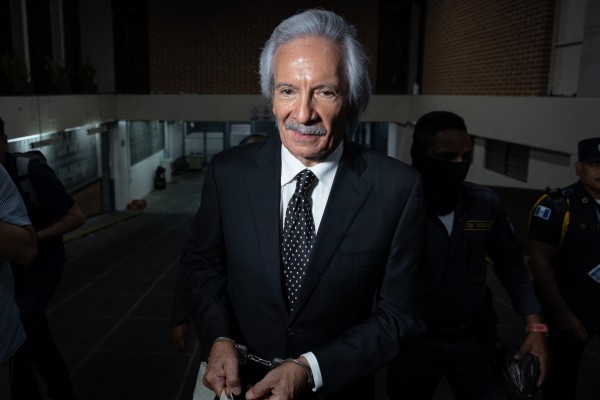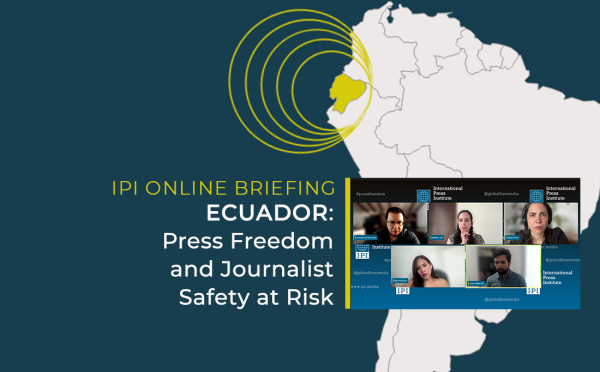The International Press Institute (IPI) and the World Association of Newspapers and News Publishers (WAN-IFRA) today called upon candidates in Mexico’s forthcoming presidential election to prioritise in their campaign platforms both reporter safety and combating impunity for crimes committed against the media.
Since April 28, Mexico has witnessed the murders of five journalists, including a crime reporter in the northwest state of Sonora kidnapped and tortured last week. While the surge in violence against the media does not appear to be directly related to the election, the events of the past month nevertheless underscore the need for a strong commitment towards press freedom from Los Pinos, Mexico’s presidential office.
On July 1 Mexicans will head to the polls to choose between three leading candidates: Josefina Vázquez Mota of the ruling National Action Party (PAN, according to its Spanish acronym); Enrique Peña Nieto of the Institutional Revolutionary Party (PRI); and Andrés Manuel López Obrador of the Party of the Democratic Revolution (PRD). Recent polls show Peña Nieto with a commanding double-digit lead.
The candidates have espoused differing tactics to combat the rampant drug-related violence that IPI considers to be one of the leading threats to press freedom in Mexico. Vázquez Mota (PAN) has largely proposed military and punitive measures reminiscent of current president Felipe Calderón Hinojasa’s (PAN) aggressive war on drugs. Peña Nieto (PRI), on the other hand, has indicated that he would prioritise reducing violence levels over combating drug trafficking. López Obrador (PRD) has focused principally on the social failures – particularly the lack of employment opportunities – that lead disillusioned youths to the cartels.
Vázquez Mota (PAN) has heavily criticised Peña Nieto (PRI) for failing to halt the spread of violence, asserting in a recent interview with Reuters that “7 out of 10 murders committed by organised crime happen in states governed by the PRI”. According to IPI’s Death Watch, media-related killings appear to follow the same line, with 36 out of the 53 journalist murders in the past six years occurring in states with PRI governors.
However, IPI’s Death Watch also reveals that the total of 53 journalists killed since President Calderón (PAN) declared war on the drug cartels in 2006 is more than double the number killed for the period 1997-2005. Moreover, while PRI-governed Veracruz is Mexico’s deadliest state for the media with 10 deaths since 2006, PRD-ruled Guerrero runs a close second with 8.
As a politically neutral body, IPI does not endorse any specific candidate and believes that no party has been able to adquately address the killings of journalists. IPI Executive Director Alison Bethel McKenzie today urged Mexico’s presidential candidates to emphasise journalist safety in their policies and messages to the public.
“All three major candidates need to speak up decisively about the importance of press freedom,” Bethel McKenzie said today. “Specifically, they need to remind the Mexican electorate of the indispensable role that Mexican journalists play in exposing official corruption and tracking the activities of organised crime. ”
She continued: “The journalist safety crisis in Mexico is not only costing the lives of brave reporters – thanks to widespread fear and self-censorship it is also infringing on the Mexican people’s basic right to information about critical public issues.”
IPI Acting Deputy Director Anthony Mills added: “No matter how it chooses to approach the drug-trafficking problem, the next government must act decisively to roll back the tide of impunity in the killing of journalists, particularly since they play a vital watchdog role in any healthy democracy.”
All three candidates condemned the recent murders of an investigative reporter and three photojournalists in PRI-governed Veracruz, according to local media reports. While primarily blaming organised crime – which she called the “principal threat to freedom of expression” – Vázquez Mota (PAN) commented: “There must have been great indifference here on the part of the state government for crime to have taken control of everything.”
In his own response to the Veracruz killings, Peña Nieto (PRI) called on authorities to exercise efficiency in locating those responsible, according to media reports. He assured that as president he would “combat impunity and [ensure] that no one remains at the margin of the law.”
López Obrador (PRD) said his administration would guarantee “the right of the media to complete their work with absolute freedom.” He added: “when the time comes we are going to put in place protection measures for journalists.”
Bethel McKenzie today reiterated her call for Mexican federal and state authorities to quickly find and bring to justice those behind the gruesome killings of Regina Martínez, Guillermo Luna Varela, Gabriel Huge Córdova, and Esteban Rodríguez in Veracruz state; and of Marco Antonio Ávila García, whose tortured body was found on the side of a highway near Guaymás, Sonora last Friday.
IPI is also asking police to clarify the May 13 murder of René Orta Salgado, a long-time crime journalist with El Sol de Cuernevaca in Morelos. Orta had taken leave from the paper in December to serve as Morelos state coordinator for a political action committee supporting Peña Nieto’s candidacy. It is unclear whether Orta’s death was related to his previous journalistic activity, or whether it represents an incidence of pre-election violence.
With just over a month to go before the vote, IPI also expressed concern at the treatment of reporter Karina Avilés of the newspaper La Jornada, who reported being the victim of verbal abuse by a campaign staffer of Vázquez Mota (PAN). The alleged incident took place as the staffer was transporting a group of journalists to a post-debate press conference. Upon finding out that Avilés worked for La Jornada, the staffer reportedly verbally attacked Avilés and succeeded in making her exit the car.
Bethel McKenzie emphasised: “All parties should provide fair access to journalists, regardless of affiliation. In a democracy, open and honest elections require the full participation of a diverse media.”
In Mexico, the president is limited to one six-year term. The PRI dominated the office for 71 years until Vicente Fox Quesada broke through for PAN in 2000. In 2006, Calderón Hinojosa (PAN) defeated López Obrador (PRD) in an extremely narrow result that was sharply contested by PRD supporters. No party currently holds a majority in either house of Congress.


